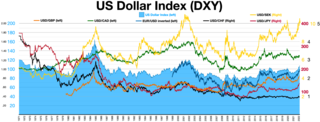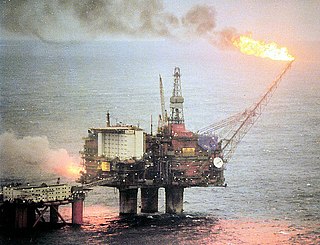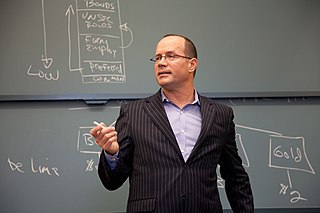Related Research Articles

The economy of Finland is a highly industrialised, mixed economy with a per capita output similar to that of western European economies such as France, Germany, and the United Kingdom. The largest sector of Finland's economy is its service sector, which contributes 72.7% to the country's gross domestic product (GDP); followed by manufacturing and refining at 31.4%; and concluded with the country's primary sector at 2.9%.

A financial market is a market in which people trade financial securities and derivatives at low transaction costs. Some of the securities include stocks and bonds, raw materials and precious metals, which are known in the financial markets as commodities.

Joseph Eugene Stiglitz is an American New Keynesian economist, a public policy analyst, and a full professor at Columbia University. He is a recipient of the Nobel Memorial Prize in Economic Sciences (2001) and the John Bates Clark Medal (1979). He is a former senior vice president and chief economist of the World Bank. He is also a former member and chairman of the Council of Economic Advisers. He is known for his support for the Georgist public finance theory and for his critical view of the management of globalization, of laissez-faire economists, and of international institutions such as the International Monetary Fund and the World Bank.
This aims to be a complete article list of economics topics:

Financial services are economic services tied to finance provided by financial institutions. Financial services encompass a broad range of service sector activities, especially as concerns financial management and consumer finance.
An exchange-traded fund (ETF) is a type of investment fund that is also an exchange-traded product, i.e., it is traded on stock exchanges. ETFs own financial assets such as stocks, bonds, currencies, debts, futures contracts, and/or commodities such as gold bars. The list of assets that each ETF owns, as well as their weightings, is posted on the website of the issuer daily, or quarterly in the case of active non-transparent ETFs. Many ETFs provide some level of diversification compared to owning an individual stock.

The foreign exchange market is a global decentralized or over-the-counter (OTC) market for the trading of currencies. This market determines foreign exchange rates for every currency. It includes all aspects of buying, selling and exchanging currencies at current or determined prices. In terms of trading volume, it is by far the largest market in the world, followed by the credit market.
Foreign exchange reserves are cash and other reserve assets such as gold and silver held by a central bank or other monetary authority that are primarily available to balance payments of the country, influence the foreign exchange rate of its currency, and to maintain confidence in financial markets. Reserves are held in one or more reserve currencies, nowadays mostly the United States dollar and to a lesser extent the euro.

From the mid-1980s to September 2003, the inflation-adjusted price of a barrel of crude oil on NYMEX was generally under US$25/barrel in 2008 dollars. During 2003, the price rose above $30, reached $60 by 11 August 2005, and peaked at $147.30 in July 2008. Commentators attributed these price increases to many factors, including Middle East tension, soaring demand from China, the falling value of the U.S. dollar, reports showing a decline in petroleum reserves, worries over peak oil, and financial speculation.

Bridgewater Associates, LP is an American investment management firm founded by Ray Dalio in 1975. The firm serves institutional clients including pension funds, endowments, foundations, foreign governments, and central banks. As of 2022, Bridgewater has posted the second highest gains of any hedge fund since its inception in 1975. The firm began as an institutional investment advisory service, graduated to institutional investing, and pioneered the risk parity investment approach in 1996.
Currency overlay is a financial trading strategy or method conducted by specialist firms who manage the currency exposures of large clients, typically institutions such as pension funds, endowments and corporate entities. Typically the institution will have a pre-existing exposure to foreign currencies, and will be seeking to:

Norway is a large energy producer, and one of the world's largest exporters of oil. Most of the electricity in the country is produced by hydroelectricity. Norway is one of the leading countries in the electrification of its transport sector, with the largest fleet of electric vehicles per capita in the world.

The following outline is provided as an overview of and topical guide to economics:

The economy of Sweden is a highly developed export-oriented economy, aided by timber, hydropower, and iron ore. These constitute the resource base of an economy oriented toward foreign trade. The main industries include motor vehicles, telecommunications, pharmaceuticals, industrial machines, precision equipment, chemical goods, home goods and appliances, forestry, iron, and steel. Traditionally, Sweden relied on a modern agricultural economy that employed over half the domestic workforce. Today Sweden further develops engineering, mine, steel, and pulp industries, which are competitive internationally, as evidenced by companies such as Ericsson, ASEA/ABB, SKF, Alfa Laval, AGA, and Dyno Nobel.
Fixed-Income Relative-Value Investing (FI-RV) is a hedge fund investment strategy made popular by the failed hedge fund Long-Term Capital Management. FI-RV Investors most commonly exploit interest-rate anomalies in the large, liquid markets of North America, Europe and the Pacific Rim. The financial instruments traded include government bonds, interest rate swaps and futures contracts.

Mark Thomas Williams is an academic, financial author and risk management expert. He is a faculty member in the Finance Department at Boston University Questrom School of Business where he teaches courses in banking, capital markets and FinTech. In 2018, he was awarded the James E. Freeman Lecturer in Management Chair.

The Wolfson Economics Prize is a £250,000 economics prize, the second largest economics prize in the world after Nobel. The Wolfson Prize is sponsored by The Baron Wolfson of Aspley Guise, CEO of retailer Next plc, and run in partnership with the think tank Policy Exchange. The Prize invites new thinking to address major economic policy issues that aren't already subject to significant public discourse. The Prize has been run on four occasions in 2012, 2014, 2017 and 2021.
Jens Nordvig is a Danish-born economist specializing in foreign exchange markets, macroeconomic policy, and data science. He is the founder of Exante Data and co-founder of MarketReader.
The 2015-2016 Chinese stock market turbulence began with the popping of a stock market bubble on 12 June 2015 and ended in early February 2016. A third of the value of A-shares on the Shanghai Stock Exchange was lost within one month of the event. Major aftershocks occurred around 27 July and 24 August's "Black Monday". By 8–9 July 2015, the Shanghai stock market had fallen 30 percent over three weeks as 1,400 companies, or more than half listed, filed for a trading halt in an attempt to prevent further losses. Values of Chinese stock markets continued to drop despite efforts by the government to reduce the fall. After three stable weeks the Shanghai index fell again by 8.48 percent on 24 August, marking the largest fall since 2007.
Record Financial Group (Record) is a British multi-asset investment management company that specializes in a range of products including currency, derivatives and hedging solutions. It was a pioneer of currency overlay for pension funds, endowments and other institutional investors. The company is one of the largest independent currency managers in the world with an AUM of US$101.3 billion as at 29 February 2024.
References
- ↑ "Spotlight on: Neil Record, Record Currency Management". Fxweek.com. Retrieved 1 November 2014.
- ↑ "Neil Record – Biography". University of Oxford. Retrieved 1 November 2014.
- ↑ "How to end the euro : One Wolfson prize finalist reveals his proposal". Cityam.com . Retrieved 1 November 2014.
- ↑ Neil Record; Currency Overlay, Wiley Finance, 2003, p.xvii
- ↑ "Neil P. Record". Bloomberg BusinessWeek. Archived from the original on 2 September 2014. Retrieved 1 November 2014.
- ↑ Neil Record; Currency Overlay, p.xvii
- ↑ "Beware the unwinding of the yen carry trade". Financial Times. Retrieved 1 November 2014.
- ↑ "Record Currency Management – About us". Recordcm.com. Retrieved 1 November 2014.
- ↑ Neil Record; Currency Overlay, back cover
- ↑ "How to end the euro : One Wolfson prize finalist reveals his proposal". Cityam.com. Retrieved 1 November 2014.
- ↑ "Sir Humphrey's Legacy: facing up to the cost of public sector pensions". ?Iea.org.uk. Retrieved 1 November 2014.
- ↑ Damian Carrington. "Two secret funders of Nigel Lawson's climate sceptic organisation revealed". The Guardian. Retrieved 1 November 2014.
- ↑ "searchthemoney.com". Searchthemoney.com. Retrieved 1 November 2014.
- ↑ "Spotlight on: Neil Record, Record Currency Management". Fxweek.com. Retrieved 1 November 2014.
- ↑ Jansen, Charlotte (6 December 2022). "Is the UK National Trust influenced by a campaign group funded by lobbyists?". The Art Newspaper. Retrieved 10 July 2022.